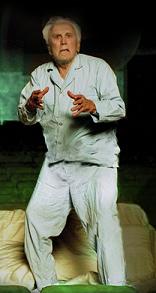The long-awaited opener to the sixth season of “The Sopranos” started out more Beatnik than Bayonne. Viewers were treated to a surreal roundup of what’s happened since we last checked in the Sopranos, some 18 months ago, with William S. Burrough’s recitation of “The Western Lands”–as featured in the song “Seven Souls” by Material–guiding the editors’ cuts and splices.
In Ancient Egyptian mythology, souls traveled to the Western Lands to find eternal rest. Burroughs explains in the opening lines of his novel that each body possessed not just one, but seven souls. As each of these seven souls is described, corresponding Soprano souls–searching for their own rest, their own immortality–are reintroduced to the viewer.
“Adriana was on screen while viewers learned about ‘the Shadow, Memory, your whole past conditioning from this and other lives,'” writes MSNBC.com’s Andy Denhart. “The Guardian Angel” was described as Meadow danced seductively in her underwear for fiancé Finn; Carmela was dreaming about Adriana as Burroughs described “The Double… the only reliable guide through the land of the dead”; and Janice and her new baby daughter were on screen as the narrator described “the Secret Name” who “directs the film of your life from conception to death.”
Slate.com’s Troy Patterson took a broader, less literal, view of Burrough’s narrative: “Perhaps the particulars of this view of the afterlife were less important than the timbre of Burroughs’ voice, a noise at once world-weary and otherworldly. Maybe this was meant as a lens for viewing the signs that followed in the episode–people wondering what would be possible if the underboss passed on; Tony’s telling his shrink that, were he losing his mind like Uncle Junior, he would hope for his family to euthanize him. Was this just a tip-off that the coming season–which makes room for Jesus, Buddha, theories of universal oneness, and meditations on Indian proverbs–will up the metaphysical ante?”
In addition to the big numinous questions, there were other more subtle allusions to faith, such as Christopher’s devotion to AA and Vito’s zealous conversion to a healthy lifestyle.
From metaphysical to Mormons, viewers were introduced to the Soprano’s new neighbors last night, the Henricksons of “Big Love.” Bill Henrickson is a polygamist married to three wives–each with financial and physical needs all her own–with whom he has seven children, each with his or her own particluar needs. Meanwhile, Bill is trying to expand a successful hardware business while being “shaken down” by the religious leader of the rogue Mormon sect he grew up in. (While the Mormon church has outlawed polygamy for more than a century now, breakaway sects, which consider themselves Mormon, continue the practice. The Henricksons belong to such a group.) And, on top of all that, Bill’s trying to determine whether his mother has been attempting to kill his father by slipping him small doses of arsenic.
You can be forgiven for thinking that Tony Soprano’s problems–multiple paramours, issues with his kids, difficulties with the family business, and family members killing each other–have simply been transported out West. Especially when it seems like the writers of the two shows are sharing notes: Tony tells A.J. at one point in Sunday’s episode that, “In the end, your friends are going to let you down. Family, they’re the ones you can depend on.” While Bill’s mother, Lois, similarly declares that only family will always love you.
What is interesting about both of these episodes is that family consumes the souls of both protagonists, even if they (especially Tony) don’t always live up to their own ideals, and both men head atypical families coping with some very typical problems. As Denhart points out, “Those seven souls inhabit [Tony]; his family is his very being.” The same could be said of Bill Henrickson, although, he has a few more family members to pack into his soul.


